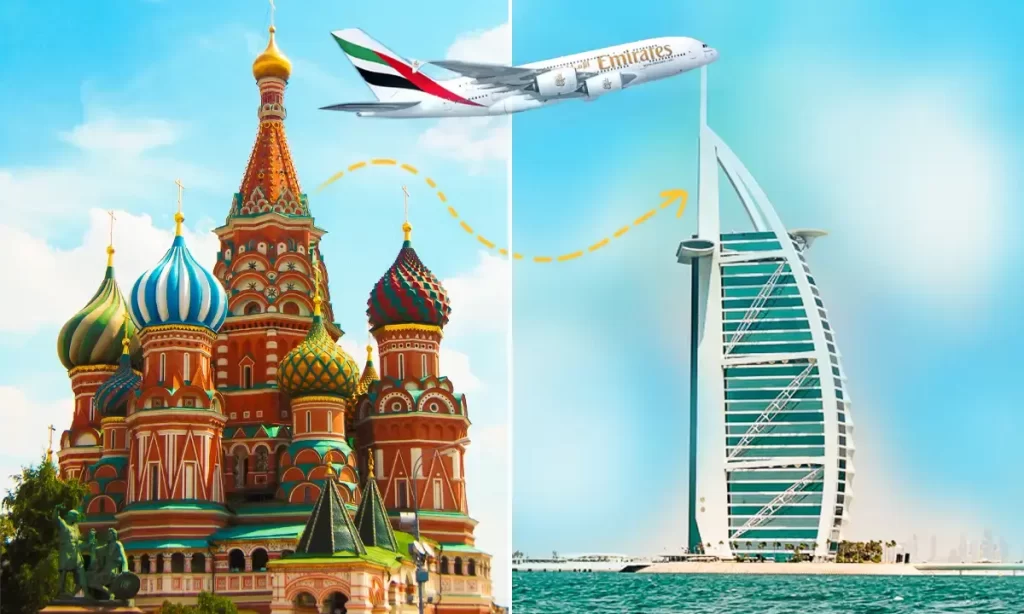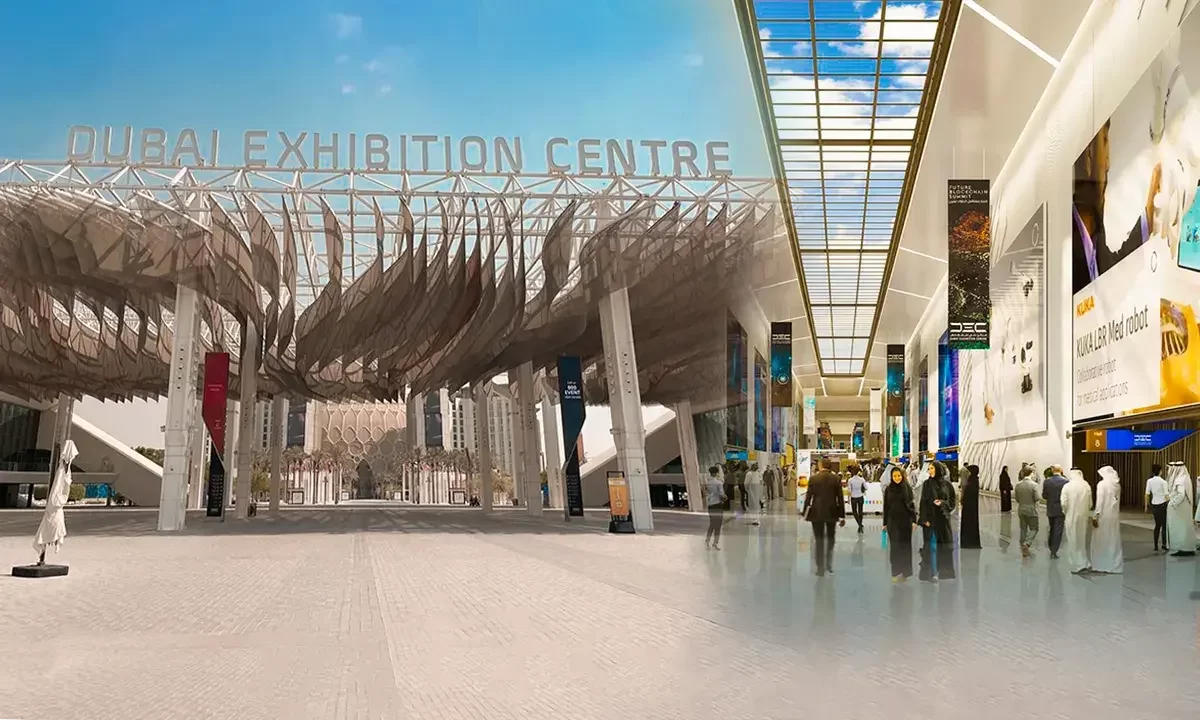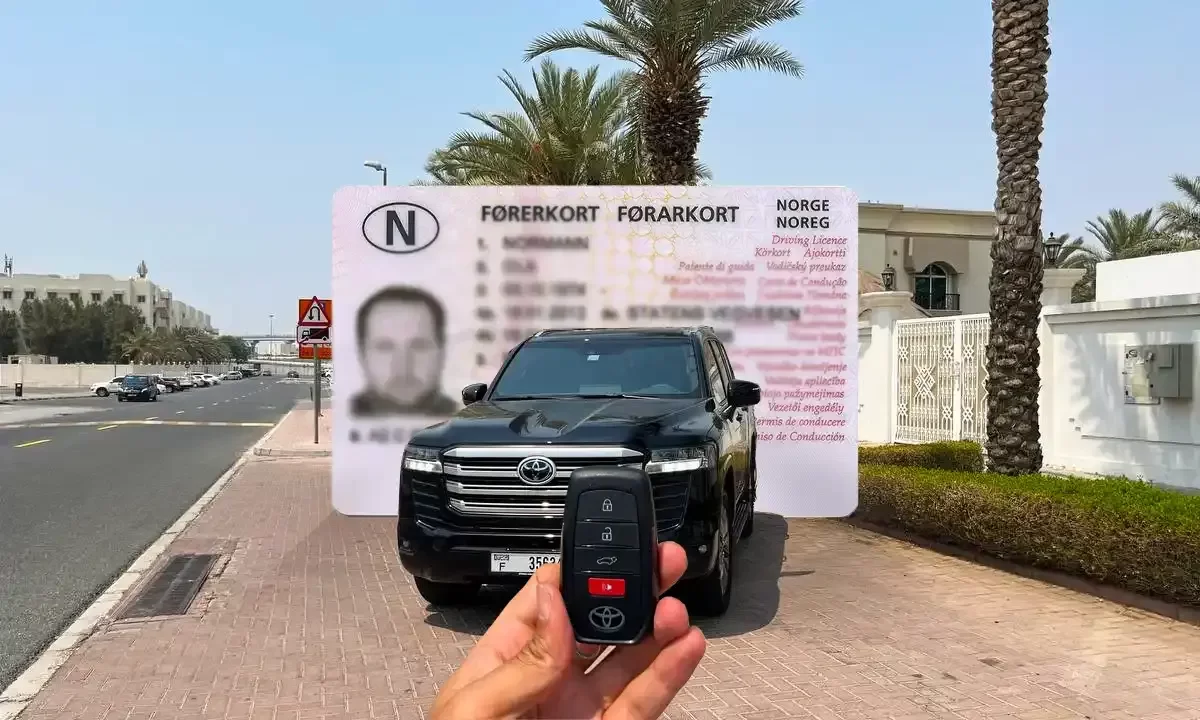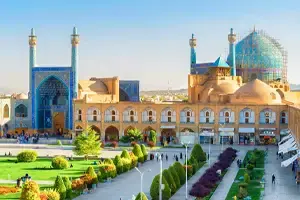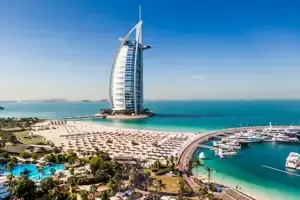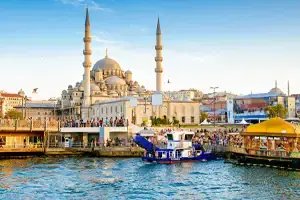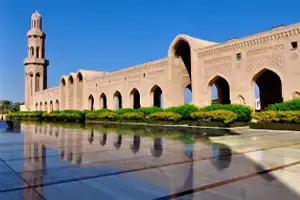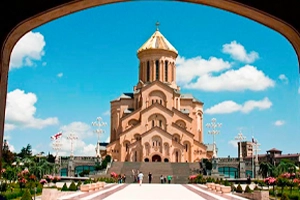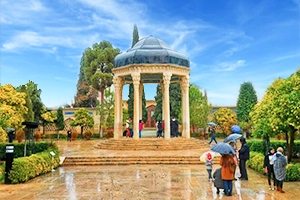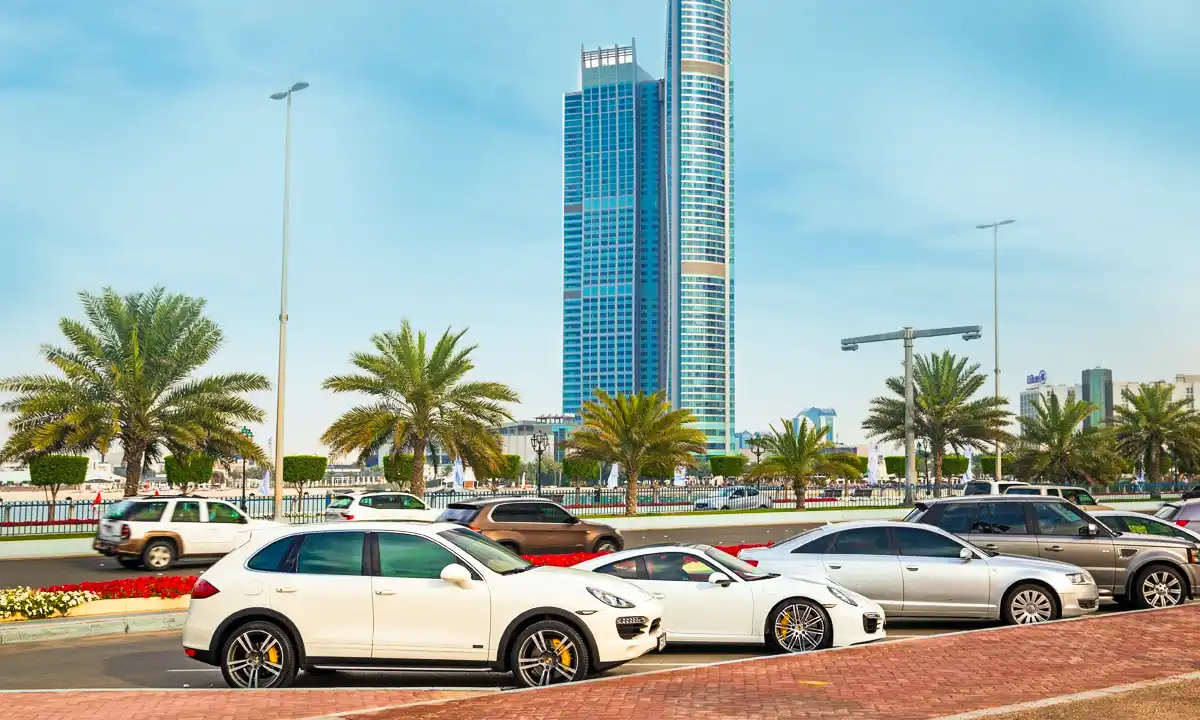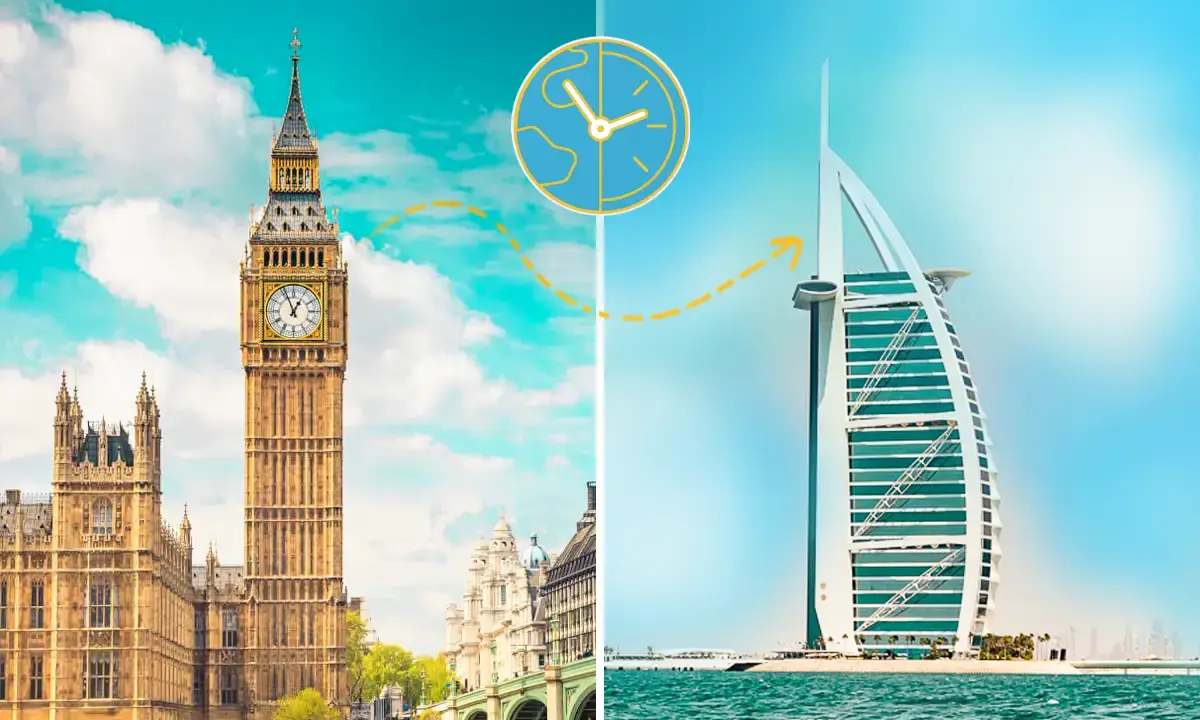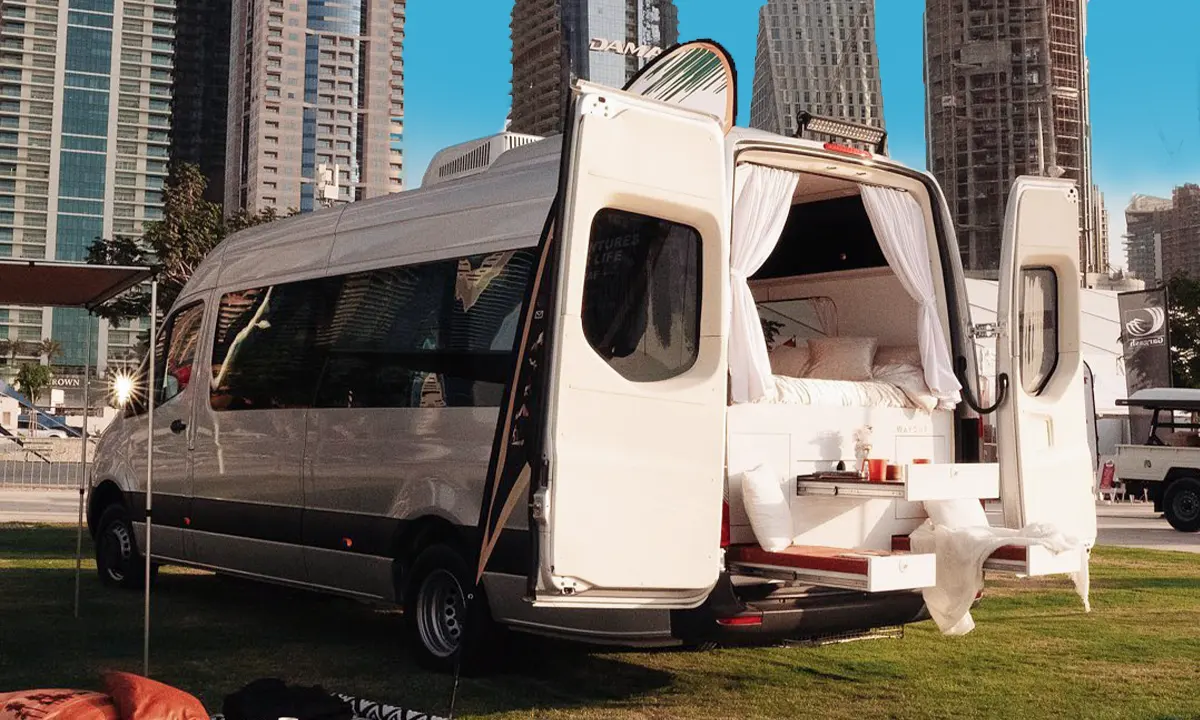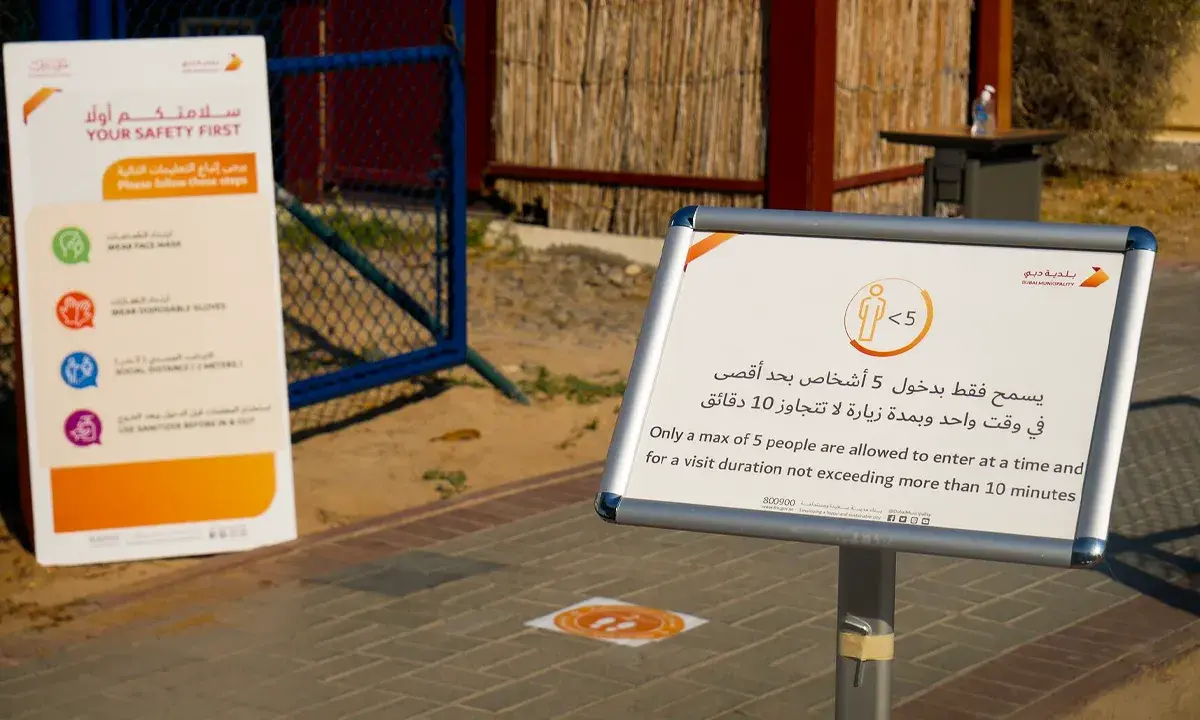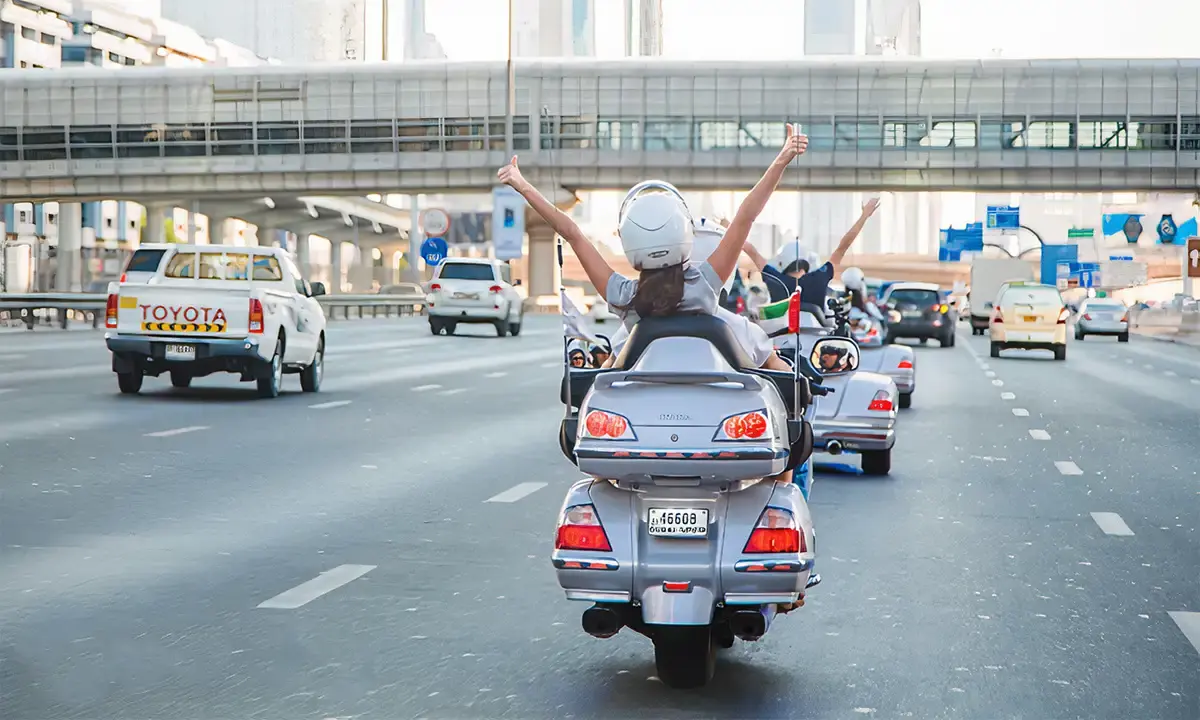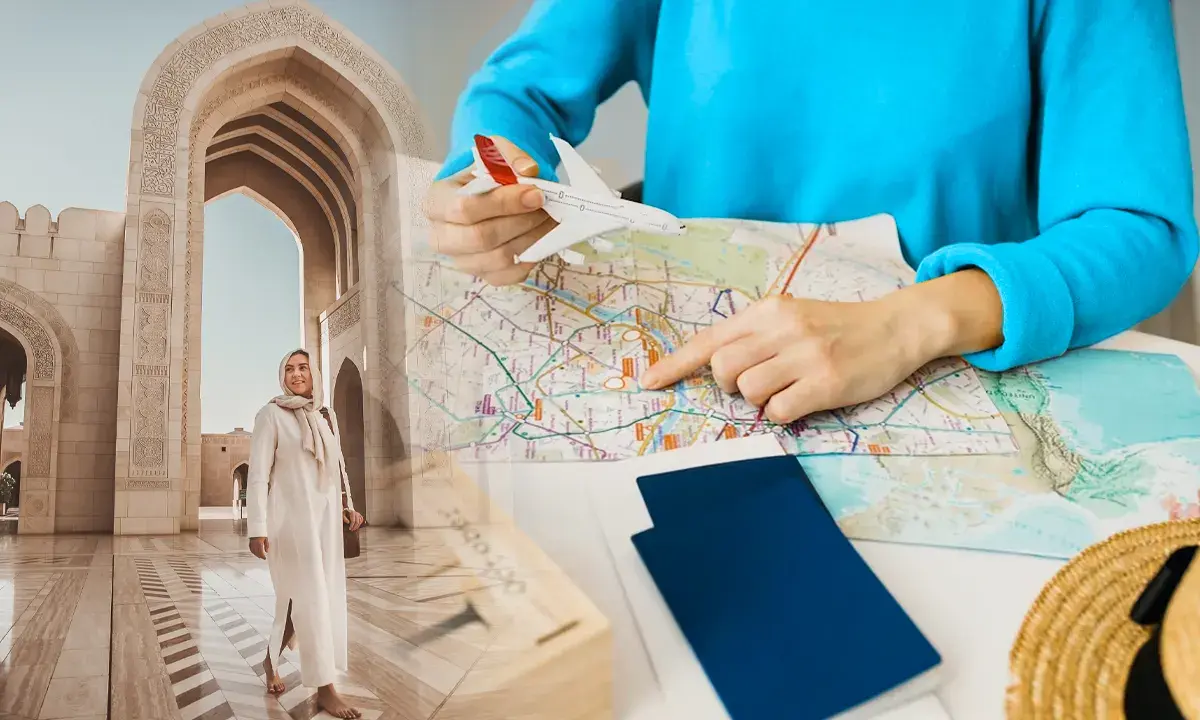Dubai, with its dazzling architecture, expansive malls, and traditional souks, is a magnet for Russian tourists. Preparing for the journey from the heart of Eastern Europe to the jewel of the Middle East requires some essential insights. This city is known for its skyscrapers, luxury, and exotic beaches, attracting numerous Russian travelers every year. If you’re planning a trip from Russia, here’s what you should know.
Article headings
Visa Requirements for Russian Citizens Traveling to Dubai:
Dubai, being one of the seven emirates of the United Arab Emirates (UAE), follows a visa policy that is friendly for Russian nationals. The visa-on-arrival provision for Russian citizens simplifies travel to Dubai, making it a popular destination. Here’s a closer look at the visa requirements:
Visa-on-Arrival for Russian Nationals:
- Duration: Russian citizens receive a visa-on-arrival that’s valid for 30 days.
- Fee: As of the last update, the visa-on-arrival for Russian tourists is free, but it’s always recommended to check for any recent changes in fee structures.
- Document Requirements: While the visa-on-arrival policy is quite convenient, tourists must ensure that they have a valid passport with at least six months of validity from the date of entry.
Visa Extension:
- Duration: The 30-day visa can be extended for an additional 30 days.
- Fee: There is a fee for the visa extension, which varies but is usually around AED 600-700.
- Process: For an extension, visitors typically need to apply before the initial visa expires. Overstaying without renewing the visa can result in fines.
General Tips:
- Travel Insurance: While not a visa requirement, it’s a good idea for travelers to have travel insurance covering medical emergencies, especially considering the high standard and corresponding high costs of healthcare in Dubai.
- Return Ticket: Often, airlines or immigration officers might request to see a return or onward ticket to ensure visitors have plans to leave the country before their visa expires.
- Respect Local Customs: Dubai is a modern city, but it’s essential to respect local customs and laws, especially regarding dress codes and public behavior.
- Potential Policy Changes: Visa policies are subject to change. It’s always advisable to check the UAE embassy website or consult travel agencies for the most up-to-date information before traveling.
In conclusion, the visa-on-arrival facility for Russian citizens makes traveling to Dubai relatively hassle-free. However, ensuring you have all the necessary documentation and understanding of the extension process will make your journey even smoother.
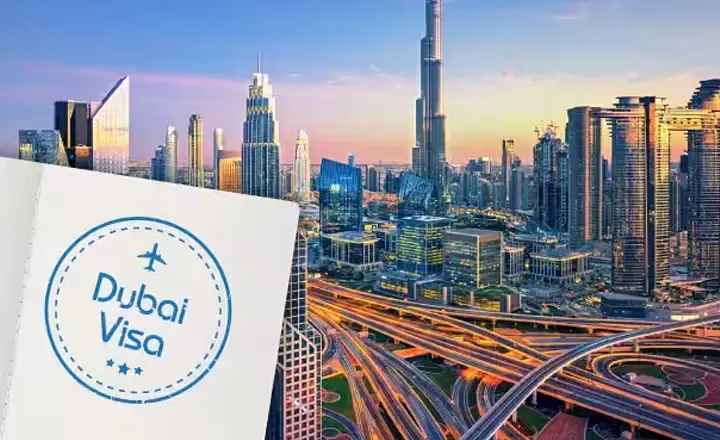
Flights from Russia to Dubai:
Dubai, as a global hub for tourism and business, is well-connected to major cities around the world, including those in Russia. Here’s more information on flights connecting Russia and Dubai:
Airlines Offering Direct Flights:
- Aeroflot: Russia’s flag carrier often has daily flights from Moscow Sheremetyevo Airport to Dubai International Airport.
- Emirates: This Dubai-based airline operates daily flights from Dubai to Moscow and vice versa. They also have regular services to other Russian cities.
- Flydubai: A budget airline based in Dubai, Flydubai has multiple routes connecting Dubai to various cities in Russia.
- Pobeda and Ural Airlines: These are Russian airlines that offer services to Dubai from various Russian cities.
Flight Duration:
- From Moscow: Direct flights usually take around 5 hours, as you mentioned.
- From Saint Petersburg: The flight duration is approximately 5 hours and 30 minutes.
- From other major Russian cities like Yekaterinburg, Novosibirsk, or Kazan, the flight time can vary between 5 to 7 hours, depending on the specific city and flight path.
Airports:
- In Dubai: Most international flights land at Dubai International Airport (DXB), which is one of the busiest in the world. There’s also the Al Maktoum International Airport (DWC) in Dubai, which caters to several flights.
- In Russia: Moscow has three major international airports – Sheremetyevo (SVO), Domodedovo (DME), and Vnukovo (VKO). Other significant Russian cities also have their international airports which facilitate travel to Dubai.
Booking and Prices:
- Prices can vary significantly based on the season, with flights generally being more expensive during peak tourist seasons in Dubai, such as the Dubai Shopping Festival or during the winter months when Dubai’s weather is most pleasant.
- It’s always advisable to book in advance, especially if traveling during these peak periods. Several online travel agencies and airline websites offer promotional deals, so it’s worth shopping around. It’s always advisable to book in advance, especially if traveling during these peak periods. Several online travel agencies and airline websites offer promotional deals, so it’s worth shopping around.
- On-Board Experience: Both Aeroflot and Emirates are known for their hospitality and service quality. Passengers can expect in-flight entertainment, comfortable seating, and a range of food and beverage options.
In conclusion, there’s no shortage of options when flying from Russia to Dubai. Given the popularity of this route, travelers can easily find a flight that fits their schedule and budget. Always check visa requirements and any travel advisories or restrictions before your journey.
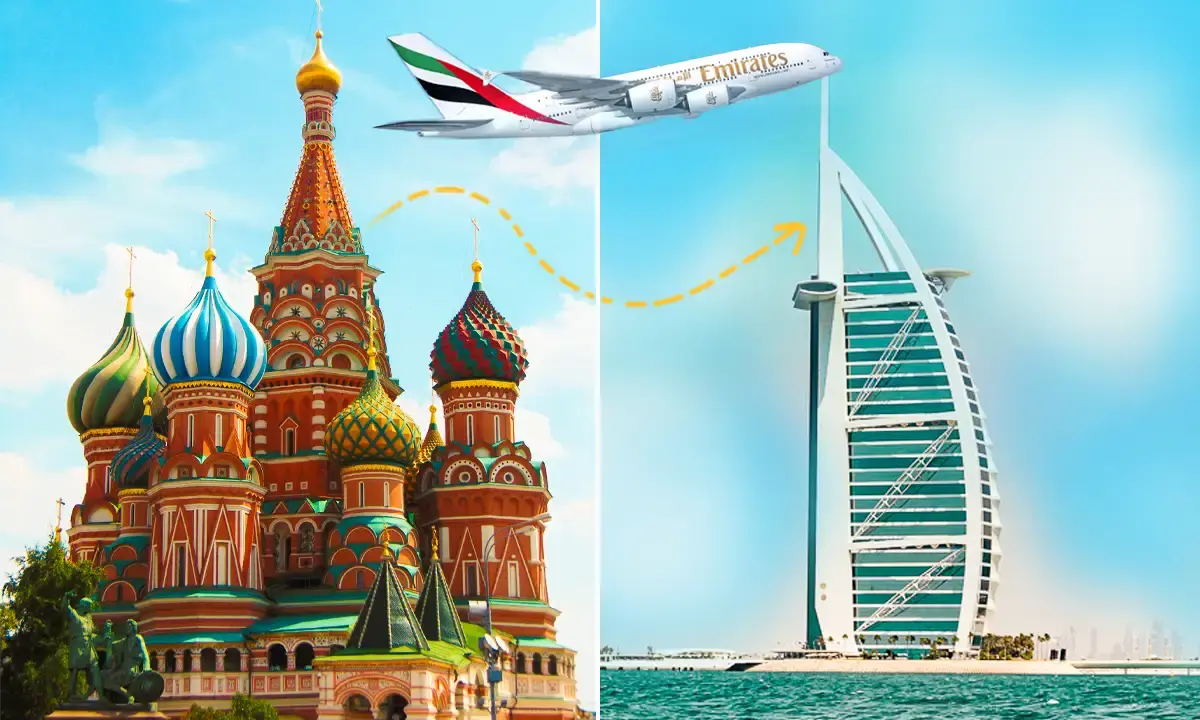
The climate in Dubai to travel from Russia:
Located in the Arabian Desert, Dubai’s climate is characterized as a tropical desert climate. Its geographical positioning means it experiences high temperatures, especially during the summer months, coupled with a low annual rainfall. Here’s a more in-depth look into Dubai’s climate:
Summer (June to September):
- Temperatures: Summer in Dubai is scorching, with daytime temperatures often exceeding 40°C (104°F) and, on some days, even reaching 45°C (113°F).
- Humidity: Along with the heat, humidity levels can be quite high, especially in the coastal areas, making the perceived temperature even hotter.
- Activities: Due to the intense heat, outdoor activities are limited during peak hours. However, Dubai is well-prepared for its summers. Most places, including public transport, shopping malls, and hotels, are air-conditioned. Many tourists use this time to explore indoor attractions, such as the Dubai Mall, Ski Dubai, and the Dubai Aquarium.
Winter (October to March):
- Temperatures: Winter months in Dubai are mild and pleasant, with daytime temperatures ranging between 24°C (75°F) to 30°C (86°F). Night temperatures can drop a bit, especially in the desert areas.
- Rainfall: While rain is infrequent in Dubai, the winter months might see some sporadic rainfall, but it’s generally light and short-lived.
- Activities: This is the peak tourist season in Dubai. The pleasant weather allows for various outdoor activities like desert safaris, beach outings, and open-air concerts.
Transitional Months (April, May, October):
- Temperatures: These months serve as a transition between the hot summers and milder winters. Temperatures start to rise in April and May and begin to drop in October.
- Activities: Tourists can still enjoy most of the outdoor activities, but it’s advisable to plan them during the cooler parts of the day.
Tips for Travelers:
- Clothing: Light and breathable clothing is recommended for the summer months. If you’re visiting during winter, it’s a good idea to carry a light sweater or jacket for the evenings.
- Hydration: Given the heat, it’s essential to stay hydrated. Always carry a bottle of water with you.
- Sun Protection: Use sunscreen, sunglasses, and hats or caps to protect yourself from the strong sun.
In conclusion, while Dubai’s climate is predominantly hot and dry, its winter months offer a more temperate environment perfect for exploration and outdoor activities. Whenever you choose to visit, Dubai has a plethora of activities tailored to its climate to ensure a memorable experience.
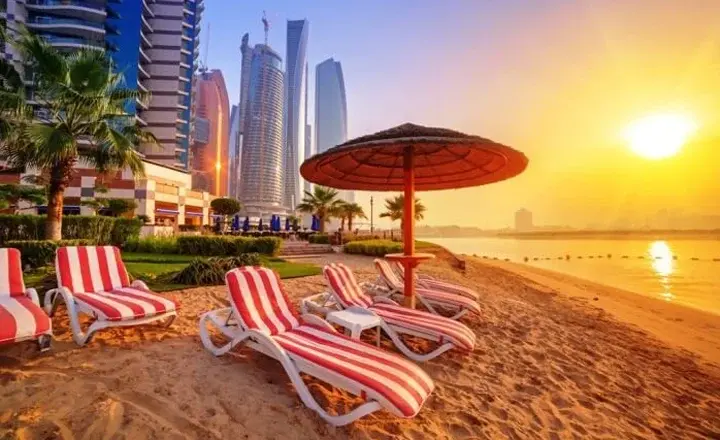
Currency in Dubai: The UAE Dirham (AED)
Dubai, being a major cosmopolitan city in the United Arab Emirates (UAE), primarily uses the UAE Dirham, abbreviated as AED.
Denominations:
- Coins: Coins are available in denominations of 5, 10, 25, 50 fils, and 1 Dirham. Note that 100 fils make up 1 Dirham.
- Banknotes: The commonly used notes include 5, 10, 20, 50, 100, 200, 500, and 1000 Dirhams.
Credit and Debit Cards:
- Dubai boasts a modern banking infrastructure, which means most major credit and debit cards (like Visa, Mastercard, and American Express) are widely accepted in hotels, malls, and upscale restaurants.
- Automated Teller Machines (ATMs) are plentiful throughout the city, from shopping centers to metro stations and even some convenience stores.
Currency Exchange:
- While the airport offers currency exchange services, for more favorable rates, it might be worth heading to a local bank or currency exchange service in the city.
- Many hotels also offer currency exchange services, but rates may vary.
Cash and Local Markets:
- When exploring traditional markets or souks, like the Gold Souk or Spice Souk, having cash can be beneficial, especially if you’re keen on bargaining.
- Some smaller eateries, especially in older parts of town, may not accept cards, making cash transactions essential.
Digital Payments and Mobile Wallets:
- With the rise of technology, digital payments are becoming increasingly popular. Mobile wallets and contactless payments are accepted in many establishments.
Tipping:
- Tipping is customary but not obligatory in Dubai. For good service in restaurants, a tip of around 10-15% is standard. For other services, like taxi drivers or bellboys, a small tip is appreciated but not mandatory.
Budgeting:
- While Dubai is often associated with luxury, it caters to all budgets. From upscale dining in Burj Al Arab to pocket-friendly eateries in Al Karama, be sure to budget according to your plans.
In summary, while Dubai is forward in terms of electronic and card transactions, it’s always useful to have some UAE Dirhams on hand, especially when diving deep into its rich and traditional culture. Always check for the most recent exchange rates and perhaps consider informing your bank about your travel dates to avoid any card transaction issues abroad.
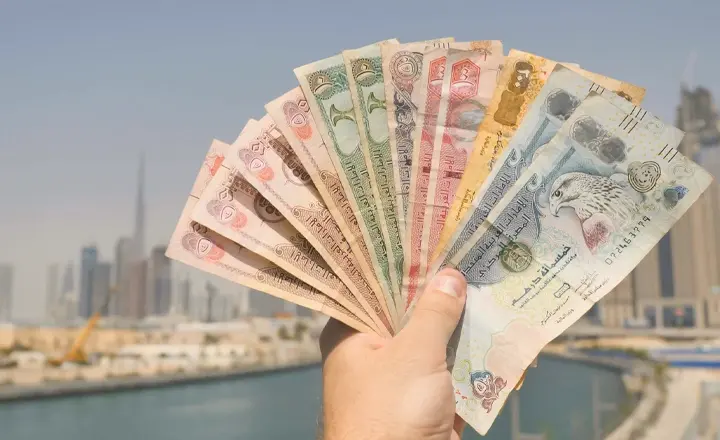
Language in Dubai: A Blend of Tradition and Modernity
Dubai, the shining jewel of the Middle East, is not only known for its majestic skyscrapers and luxurious lifestyle but also for its rich tapestry of cultures and languages. Here’s a closer look at the linguistic landscape of the city that you should know before traveling from Russia to Dubai:
Arabic: The Official Language
- Arabic holds pride of place in Dubai as the UAE’s official language. It’s used in government communications, road signs, official documents, and local media.
- While the Arabic script might seem intricate and exotic to non-Arabic speakers, it’s a significant aspect of the region’s cultural heritage.
English: The Lingua Franca
- Owing to Dubai’s role as a global business hub and a melting pot of nationalities, English has become the de facto lingua franca. It’s widely spoken in businesses, shopping malls, hotels, and restaurants.
- Most signage in Dubai, including road signs and information boards, is bilingual, featuring both Arabic and English.
Diverse Population, Diverse Tongues
- With over 200 nationalities calling Dubai home, the city is a cacophony of languages. It’s common to hear Tagalog, Urdu, Hindi, Bengali, Russian, Chinese, and many other languages spoken on the streets.
- Many residents in Dubai are expatriates, which has made the city a mosaic of cultures and languages.
Learning Basic Arabic
- While not necessary for getting by in Dubai, learning a few basic Arabic phrases can be a rewarding experience. Not only does it help in immersing oneself in the local culture, but it’s also a gesture of respect that’s often appreciated by locals.
Some useful phrases include: - Salam (سلام) – Hello
- Shukran (شكرا) – Thank you
- Ma’assalama (مع السلامة) – Goodbye
- Afwan (عفوا) – You’re welcome
Language and Hospitality
- Dubaians are renowned for their hospitality. Even if you stumble with your Arabic phrases, your efforts are likely to be met with a smile and an appreciative nod. It’s all about the gesture and the willingness to connect.
Language Learning Opportunities
- If you’re spending a considerable amount of time in Dubai and are interested in delving deeper into the Arabic language, numerous institutes offer courses. Whether it’s for business, travel, or personal interest, there’s an opportunity to learn at every corner.
In conclusion, Dubai’s linguistic landscape is a reflection of its vibrant and diverse populace. While Arabic remains at the heart of its identity, the city’s international character ensures that communication is never a barrier for visitors. Whether you’re ordering food at a restaurant, shopping in a mall, or exploring the winding lanes of a traditional souk, you’ll find that language, in Dubai, is more about connection than mere words.
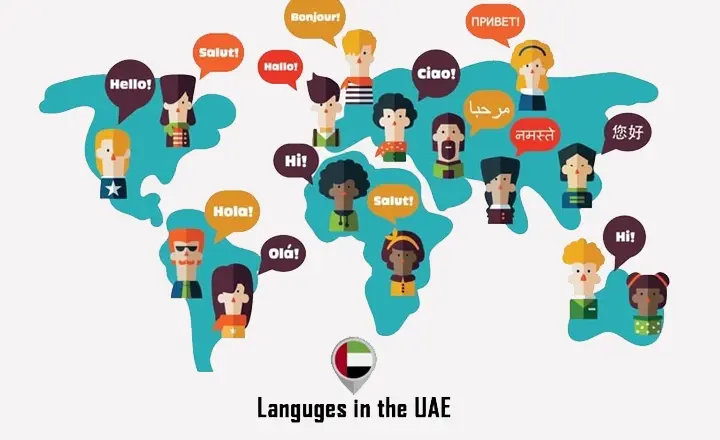
Cultural Respect in Dubai: Navigating Tradition in a Modern Metropolis
One of the important things that you should know before traveling from Russia to Dubai is knowing the culture of this city. Dubai, with its towering skyscrapers, futuristic architecture, and luxurious resorts, often feels like a city of the future. However, beneath this ultra-modern façade lies a heart deeply entrenched in Islamic culture and Emirati traditions. Here’s how to navigate Dubai with cultural sensitivity and respect:
Dress Code: Modesty Matters
- While Dubai is more liberal than some other Middle Eastern cities, dressing modestly is a sign of respect, especially when visiting mosques, traditional neighborhoods, or government buildings.
- Women are advised to wear dresses or skirts that are knee-length or longer and tops that cover the shoulders. It’s a good practice to carry a scarf or shawl, which can be draped over the shoulders when necessary.
- Men should avoid wearing shorts and sleeveless shirts in religious or traditional places. Long trousers and a shirt or T-shirt are recommended.
Public Displays of Affection: Less is More
- Holding hands for married couples is generally acceptable, but beyond that, public displays of affection, like hugging or kissing, are frowned upon and best avoided in public spaces.
Ramadan: A Holy Month of Fasting
- During Ramadan, Muslims fast from dawn until sunset. Even if you’re not fasting, it’s essential to be respectful of this practice.
- Eating, drinking, smoking, or even chewing gum in public during daylight hours is discouraged and could offend. Many restaurants remain closed during the day but reopen at sunset for Iftar, the meal that breaks the fast.
- Nights during Ramadan come alive with special prayers, meals, and gatherings. While it’s a beautiful time to experience Emirati culture, remember to maintain a respectful demeanor.
Alcohol Consumption: Know the Boundaries
- Alcohol is available in licensed hotels, bars, and private clubs. However, drinking in public places or being publicly drunk is illegal and could lead to fines or imprisonment.
Language: Mind Your Words
- Swearing, rude gestures, and public arguments can lead to significant fines or deportation. Always communicate with respect and avoid sensitive topics in public discussions.
Visiting Mosques: Tread with Reverence
- Some mosques, like the Jumeirah Mosque, are open to non-Muslim visitors. When visiting, ensure you’re dressed appropriately, remove your shoes before entering, and follow any guidelines provided by the mosque.
Photography: Ask Before You Snap
- While Dubai offers countless photo opportunities, always ask for permission before taking photos of people, especially Emirati women. Also, be cautious when photographing government buildings, airports, and military installations.
Gender Interactions: Approach with Care
- Unless introduced, it’s advised for men to wait for an Emirati woman to extend her hand first. Some women might prefer not to shake hands with men due to religious reasons.
In summary, while Dubai is a melting pot of cultures and offers a relatively liberal environment, visitors should always be aware of and respect its cultural nuances. By doing so, you’ll not only ensure a smooth stay but also gain a deeper appreciation for the city’s rich tapestry of tradition and modernity.
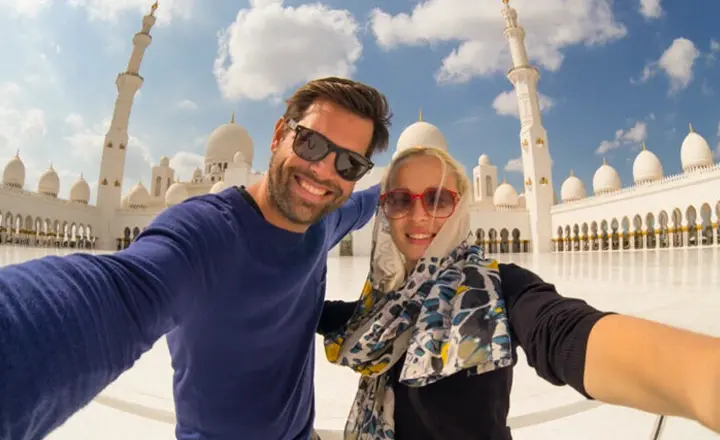
Transport in Dubai- One of the important things for Russian Tourists
When you travel to Dubai from Russia, you should know about the best way to get to the location that you like.
Taxi:
- Availability: Taxis in Dubai are plentiful, easily recognizable with their cream-colored exteriors, and can be hailed off the street or booked in advance through a call or app.
- Safety: They are considered safe, and all are metered, ensuring transparency in pricing.
- Ladies Taxi: Dubai also offers a unique ‘pink taxi service’ specifically for female passengers, driven by female drivers.
Dubai Metro:
- Coverage: The Dubai Metro, inaugurated in 2009, is a state-of-the-art, driverless, fully automated rail system. It primarily has two lines – the Red Line and the Green Line, connecting major tourist spots and business centers.
- Efficiency: Trains are punctual, clean, and efficient, making them one of the most favored modes of transport.
- Nol Card: To use the metro, you would need a Nol Card, which can also be used on buses, trams, and water buses.
Buses and Trams:
- Buses: Dubai’s bus network is extensive, connecting various parts of the city. It’s a more economical way to travel but can be slower due to traffic.
- Trams: The Dubai Tram runs in a loop around the Marina and JBR area, providing an easy way to explore these regions.
Car Rentals:
- Options: There are numerous car rental agencies in Dubai, offering everything from economy cars to luxury vehicles.
- Driving: While Dubai’s roads are well-maintained and signage is clear, driving can be daunting for newcomers due to the fast-paced nature of local drivers.
- Parking: There are ample parking spaces available in most areas, but always ensure you park in designated zones to avoid fines. You can use car rental in Dubai to have a great and easy travel.
Water Transport:
- Abras: Traditional wooden boats called ‘abras’ are a unique way to travel between Deira and Bur Dubai, offering a scenic view of the city.
- Water Taxis & Ferries: These are modern, air-conditioned boats connecting various parts of the city.
Biking:
- Bike Stations: Dubai has been increasingly promoting cycling with dedicated bike paths in certain areas. You can rent bikes from various stations located around the city.
Tips for Travelers:
- Rush Hour: Traffic congestion is common during rush hours (7-9 am & 5-7 pm). Plan travels accordingly.
- Public Etiquette: While using public transport, be respectful. There are designated seats for women, children, and the elderly. Refrain from eating or drinking on the metro.
- Apps: Apps like RTA Dubai provide real-time information on public transportation, while navigation apps like Google Maps or Waze can guide you when driving.
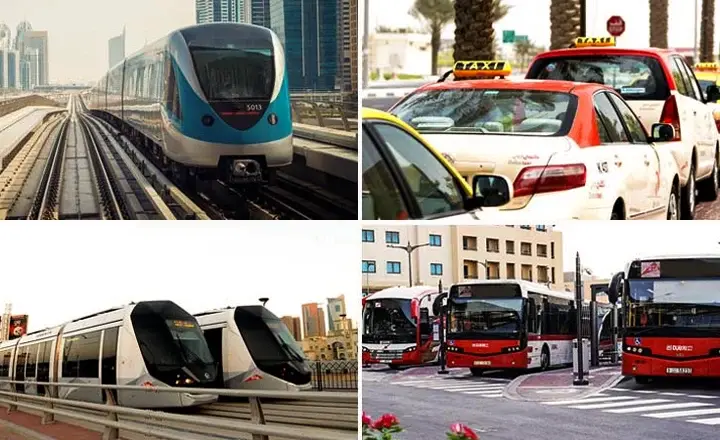
Complete information about Dubai for Russian tourists
Dubai has become a favorite destination for many Russian tourists over the years. The reasons for this are manifold, ranging from geographical proximity to cultural attractions.
Attractions in Dubai:
- Burj Khalifa:
- Standing at 828 meters, it’s the world’s tallest building. The observation decks on levels 124, 125, and 148 offer panoramic views of the cityscape.
- Dubai Creek:
- This saltwater estuary is the historical part of Dubai, showcasing its trading heritage. Traditional abra boats ply the creek, offering a glimpse into the city’s past.
- Dubai Mall:
- One of the world’s largest shopping malls, it houses over 1,200 shops, an ice rink, an enormous aquarium, and an underwater zoo.
- Desert Safaris:
- Experience the thrill of dune bashing, camel rides, and traditional Arabian nights with cultural performances and BBQ dinners in the vast Dubai desert.
- Dubai Fountain Show:
- Set in the Burj Khalifa Lake, this mesmerizing water, lights, and sound show is the world’s largest choreographed fountain system.
- Dubai Marina:
- A man-made canal city, Dubai Marina offers a skyline filled with skyscrapers, yachts, and waterfront restaurants.
- Al Fahidi Historic District:
- A restored area that provides a peek into Dubai’s architecture and way of life in the past.
- Palm Jumeirah:
- An iconic man-made island with luxury resorts, waterfront apartments, and attractions like the Atlantis hotel.
- Dubai Opera:
- Located downtown, this architectural masterpiece offers a diverse lineup of performances, from operas to ballets and concerts.
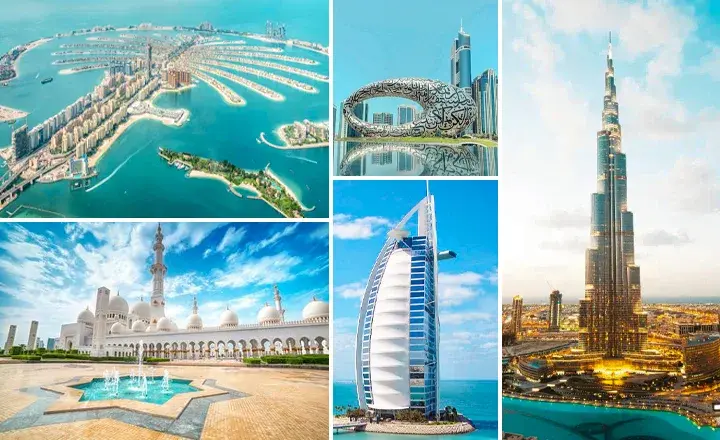
Local Sim Card:
- Providers:
- The two main telecom providers in Dubai are Etisalat and du.
- Tourist SIM:
- Both providers offer special tourist SIM cards with bundled offers that include local and international calling minutes, SMS, and data.
- Where to Buy:
- You can purchase these SIM cards at the airport, malls, or any authorized store. Remember to carry a valid ID for registration.
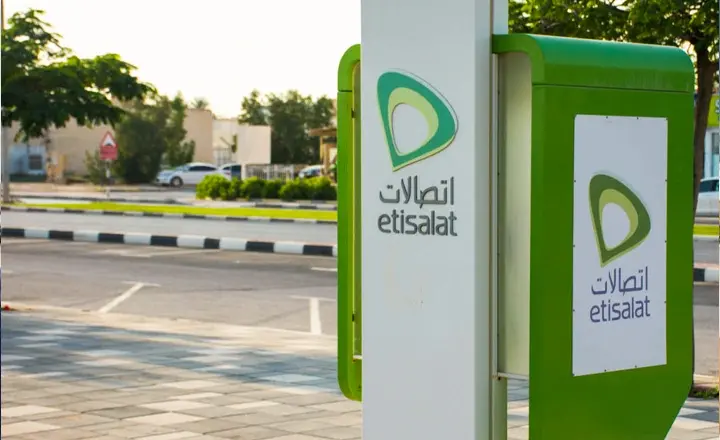
Safety in Dubai:
- Crime Rate:
- Dubai boasts a very low crime rate. The police are efficient and equipped with modern technology, ensuring the safety of residents and tourists alike.
- Travel Precautions:
- As in any major city, be aware of your surroundings, especially in crowded places, and avoid leaving personal belongings unattended.
- Local Laws:
- Dubai’s laws are rooted in Islamic traditions. It’s essential to be aware of and respect them, especially concerning public behavior, dress code, and alcohol consumption.
- Emergency Number:
- Dial 999 for police emergencies. It’s advisable to save local emergency numbers on your phone.
- Medical Safety:
- The city is equipped with world-class medical facilities. However, it’s recommended for tourists to have travel insurance covering potential medical emergencies.
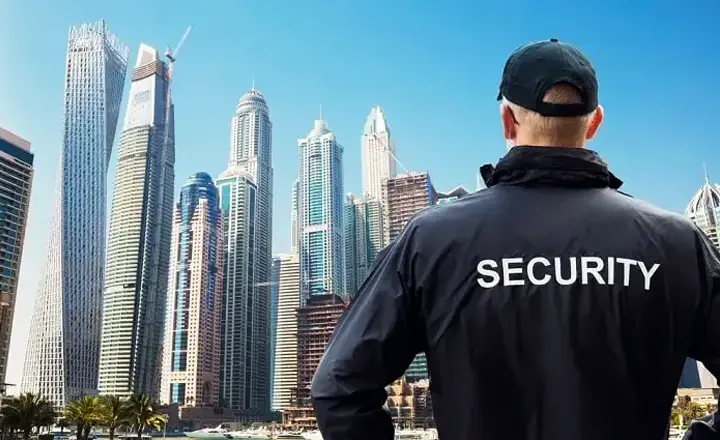
Last Word
In conclusion, Dubai seamlessly blends the allure of its ancient heritage with its ambitious futuristic vision. Its high safety standards and the plethora of attractions ensure an enriching experience for visitors. Whether you’re marveling at the towering skyscrapers, soaking in the local culture, or venturing into the desert’s vastness, Dubai promises a memorable experience.
Do Russian citizens need a visa to visit Dubai?
Yes, but Russian citizens can avail themselves of a visa-on-arrival facility when they land in Dubai. This visa is valid for 30 days and can be extended for another 30 days if needed. However, always check for the latest visa regulations before planning your trip.
What is the best time for Russian tourists to visit Dubai considering the climate?
While Dubai is a year-round destination, many Russian tourists prefer the winter months (October to March) in Dubai for its milder temperatures. This period provides a pleasant escape from the cold Russian winter. The summer months (June to September) in Dubai can be very hot and might not be comfortable for outdoor activities.
Are there direct flights from major Russian cities to Dubai?
Answer: Yes, several airlines offer direct flights from major Russian cities like Moscow and Saint Petersburg to Dubai. The flight duration from Moscow to Dubai is typically around 5 hours. Airlines like Aeroflot, Emirates, and Fly Dubai frequently operate on this route.
Given the cultural differences, are there any specific guidelines Russian tourists should be aware of in Dubai?
Answer: Dubai, though modern, is deeply rooted in Islamic traditions. It’s advisable to dress modestly, especially when visiting religious or traditional places. During the holy month of Ramadan, be mindful of eating or drinking in public during daylight hours. It’s always a good idea to familiarize oneself with local customs and etiquettes to ensure a respectful and enjoyable visit.
